Maritime Agencies
AMES 2024: OGBEIFUN Regrets Nigeria’s Indifference To Global Shipping, Urges A Reawakening.
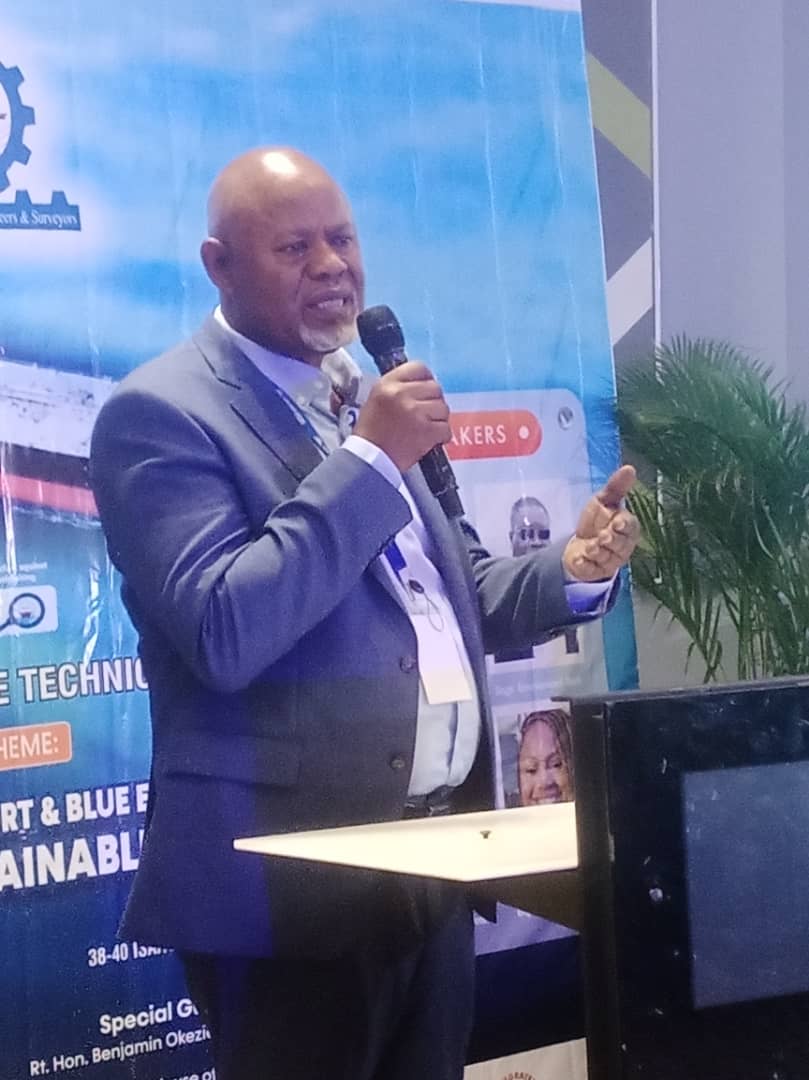
By Izuchukwu Ozoemena
Engr Greg Ogbeifun, a towering figure in Nigeria’s shipping industry, has taken time off retirement to tell truth to power regarding what the Federal Government must do to reap the huge gains embedded in the marine and blue economy now a new ministry is in place in order not to keep incurring losses which he conservatively valued at over $9.2 billion annually.
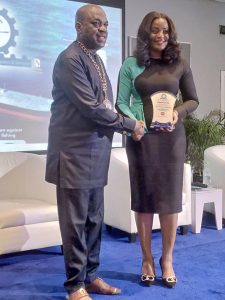
AMES President, Engr Israel Obadan, presenting an award to Iroghama Ogbeifun, CEO, Starzs Investment Co Ltd.
Presenting the lead paper entitled ‘Overcoming Challenges Against Re-emergence Of Global Shipping Lines: A Nigerian Perspective’ at the 16th Technical Summit of the Association of Marine Engineers and Surveyors (AMES), Thursday, Engr Ogbeifun pointedly told the massive assemblage of marine engineers and other maritime professionals that over 90% of them were already aware of the issues inhibiting Nigeria’s participation in global shipping which, for whatever reasons, the authorities decided to neglect for too long.
Engr Ogbeifun who recalled that since NIMAREX Expo in 2011, he had been consistently agitating for the creation of a separate ministry for the maritime sector, congratulated President Tinubu for achieving this in 2023. But as it is today, he cautioned, can Nigeria be talking about a marine and blue economy ministry when her waters remain largely brackish?
Ogbeifun, the Chairman of Starzs Investment Company Ltd and pioneer President of the Shipowners Association of Nigeria (SOAN) said Nigeria generates about 70% of the total cargo traffic within the West and Central African region.
“However, despite its geographical advantages and these huge opportunities”, he regretted, “Nigeria has failed to participate in the carriage of these abundant cargoes due to the lack of any Nigerian shipping line. This means that the country relies heavily on foreign vessels for the shipment of its inbound and outbound cargoes, leading to significant economic loss and negative security implications.”
He referred to the African Continental Free Trade Area (AfCFTA) regime, describing it as a major opportunity Nigeria has to wake up from her slumber and participate in continental shipping which can lead to increased foreign direct investment and a 7% upsurge in national income from what obtains now up to 2043. But where are the indigenous shipping lines? He attributed the collapse of the Nigerian National Shipping Line (NNSL) in 1995 to corruption in high and low quarters, mismanagement and abuse by government officials, budget misappropriation and other man-made factors.
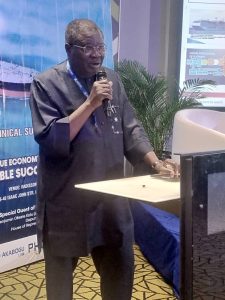
Rev Engr Emmanuel Ilori
“The demise of NNSL means Nigeria has since then lost all of the benefits of owning a global fleet and participating in the carriage of its cargo”, he pointed out.
The result, he declared, include loss of jobs, loss of freight earnings, loss of national tonnage capacity, distorted balance of trade, and a poor reputation in the comity of maritime nations.
With one vessel, ‘MV Abuja’, Nigeria, in 1996, commenced operations under the banner of the National Unity Line (NUL), flying Nigeria’s national flag and relaunching her into international reckoning. But by 2005, the NUL went the way of its predecessor, the NNSL.
Engr Ogbeifun recalled with great nostalgia that it breaks his heart each time he looks at the ports, all the quays and jetties are filled up with ships. But how many of them are owned by Nigerians?
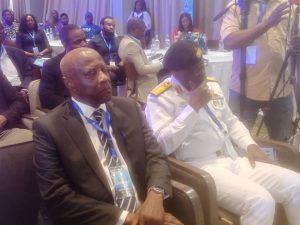
Capt Emmanuel Iheanacho and Rear Admiral Baratuaipri Iyalla
“The likes of Captain Emmanuel Ihenacho, Chief Isaac Jolapamo, and Temisan Omatseye, who bought ships in the past, the system killed their businesses. With the jobs they were providing and the economic benefits to the nation, everything went down.
“There are challenges that have made it very impossible for this country, since the demise of the Nigerian National Shipping Line in 1995, to own ships.
“Nigeria has a growing demand for shipping services, but the government has not made it possible for indigenous operators to own ships. The result of this has made Nigeria completely rely heavily on foreign ships to move her goods.
“Conservatively, Nigeria is losing about $9.2bn to foreign vessels dominance of her trade. We are the ones paying that money to the foreign vessel owners. Every Nigerian who imports or exports is paying hugely.
“I don’t think our leaders need a prophet to tell them that they need to be in a hurry to ensure Nigerians participate in her shipping freight.
“The enabling policies need to be implemented. How can Nigerians compete with foreign vessel owners who enjoy zero duty and a near-zero tax regime? It is high time our leaders provided policies that encourage indigenous shipping in this country.”
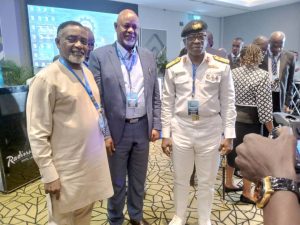
Regarding the beleaguered Cabotage Vessel Financing Fund (CVFF), Engr Ogbeifun asked ship owners to close ranks and form a formidable voice and begin to engage the authorities at least for the sake of the younger generation. He regretted that ship owners are crying while the waterfronts have now been converted into a mortuary for ships. Government, he insisted, must carry out reasonable fiscal policy reviews to empower Nigerian ship owners to be able to compete with their foreign counterparts.

He strongly advocated for the establishment of a Nigerian Maritime Bank, Nigerian fleet (not necessarily a national fleet).
“Let’s see a practical approach towards actualizing the exploitation of the marine and blue economy. The Marine and Blue Economy ministry has been established. Let the private sector drive the activities.”
Maritime Agencies
MARAN Hosts Discussion on Nigeria-China Currency Swap Deal: Opportunities, Challenges
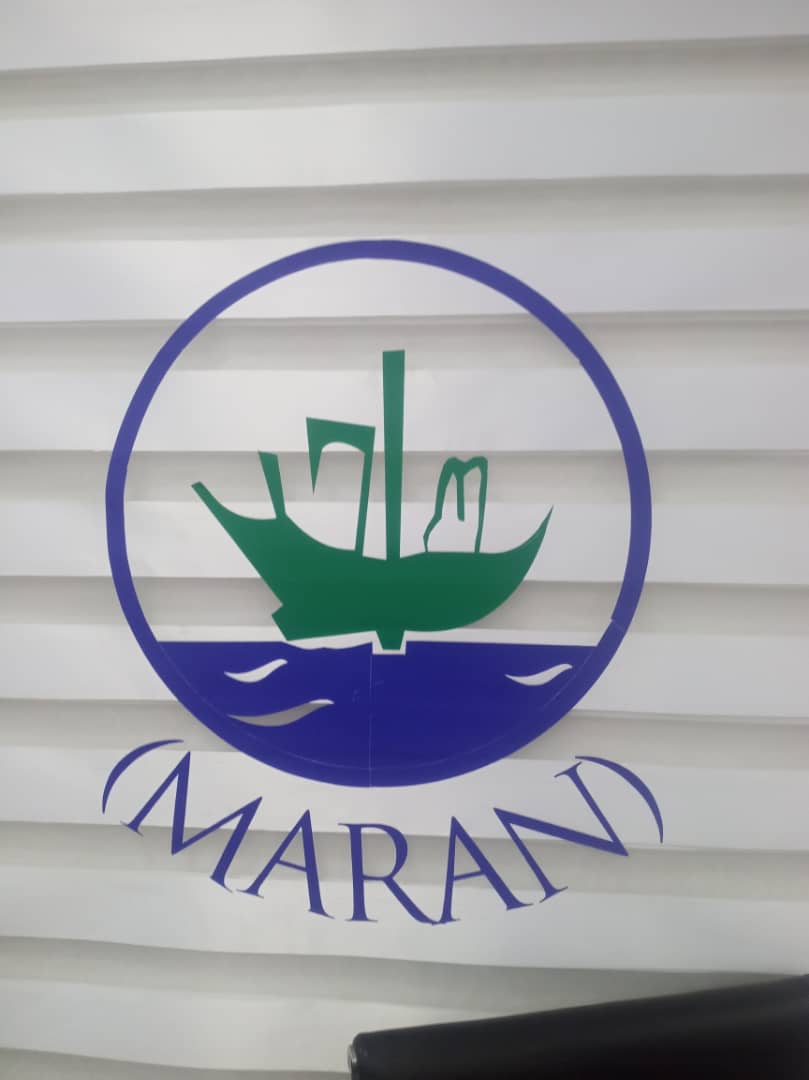
By Izuchukwu Ozoemena
Come April 15, 2025, the Maritime Reporters’ Association of Nigeria (MARAN) will play host to a top- flight event with the theme “Navigating the Nigeria-Peoples Republic Of China Currency Swap: Opportunities and Challenges for Import, Export and Maritime Business”.
The landmark event which takes place a the Rockview Hotel, Apapa GRA, Lagos, will bring together critical stakeholders in the import and export business, policy-makers, and government agencies to examine the Nigeria-China Currency Swap deal and the implications on Nigeria’s maritime industry.
The currency swap agreement, worth 15 billion Yuan ($2 billion), enables the direct exchange of the Chinese Yuan and the Nigerian naira, bypassing the US dollar.
This groundbreaking deal, according to Godfrey Bivbere, President of MARAN, is expected to foster stronger bilateral trade, between Nigeria and China by reducing transaction costs and boosting economic cooperation.
The MARAN President emphasized that in line with her role agenda-setting role, the association recognizes the importance of interrogating the policy further considering the debilitating effect of the American dollar on importation and China’s significant role as Nigeria’s biggest import partner.
Participants expected at the event include the Central Bank of Nigeria (CBN), the Nigeria-China Strategic Partnership (NCSP) and the Chinese Embassy in Nigeria.
Others are the Ministry of Finance, importers, exporters, maritime operators, policy-makers, economists, financial institutions, and trade organizations.
The event aims to provide an enhanced understanding of the Nigeria-Peoples Republic Of China currency swap and its impact on stakeholders in import, export, and maritime businesses.
The meeting will also identify potential risks and opportunities arising from China’s growing economic influence in Nigeria and provide actionable recommendations for stakeholders to navigate changes in the trade and maritime landscape.
Maritime Agencies
Zoe Maritime Breakfast Meeting: NCDMB, NIWA, LASWA Discuss Maritime Logistics, Sustainability of Ocean Economy.
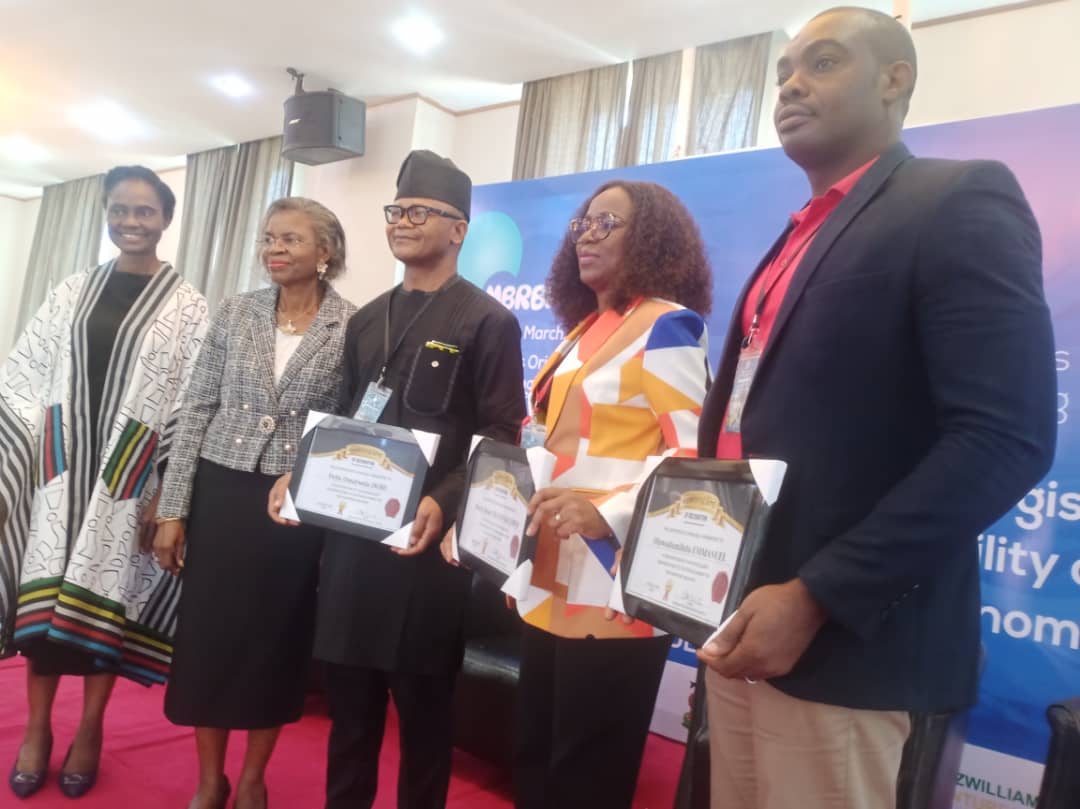
By Izuchukwu Ozoemena
In furtherance of a mandate to champion local human resources input into operations in Nigeria’s oil and gas sectors, the Nigerian Content Development and Monitoring Board (NCDMB) has instituted the Nigerian Content Forum
However, the agency’s intervention in the maritime space has been challenging as she struggles with in-country value addition and pushback in efforts to make progress.
NCDMB Executive Secretary/CEO, Mr Felix Omatsola Ogbe stated this in Lagos, Thursday, during a panel discussion at the 2025 edition of the Maritime Business Roundtable Breakfast Meeting organized by Zoe Maritime Resources Ltd with the theme ‘Maritime Logistics and Sustainability of the Ocean Economy’. Other dignitaries on the discussion included Oluwadamilola Emmanuel, General Manager, Lagos Waterways Authority (LASWA), Engr Elsie Egwuatu, Head of Marine, Lagos Area Office of the National Inland Waterways Authority (NIWA) and Ruth Ikem Chukwukezirim, CEO, Global Energy & Logistics.
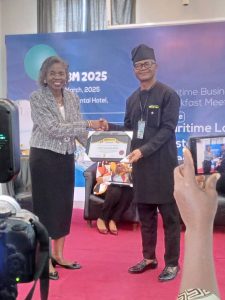
Mr Ajimijaye receiving a souvenir on behalf of NCDMB Executive Secretary/CEO.
Speaking through Silas Omomehin Ajimijaye, General Manager, Research, Statistics and Development, the NCDMB boss referred to the $350 million intervention fund up for grabs by local shipping companies. Not less than 10 Nigerian companies, he explained, have accessed the facility.
“As a matter of fact, before I came here, I was speaking with one of those companies that have benefitted from our intervention. A good example is Starzs Group. They said they are very happy with what NCDMB has done to help them as a as a company. I know the MD, Iro Ogbeifun, a lady who is doing so fantastically well. That is one of those cases we talk about women empowerment. The company is doing well. Not only them, there are several others we are working with to deepen in-country value addition in the maritime sector.”
The fund which keeps growing is disbursed as a single digit loan businesses use and pay back. “This fund is being managed by the Bank of Industry (BOI). Every now and then, they provide a report to show how it is going.”
On collaboration with other agencies, Mr Ajimijaye said part of NCDMB’s mandate is to collaborate with NIMASA to deepen local content through the Nigerian Content plan which should be enshrined into every contract arrangement.
“You have to state what Nigerian Content plan you have now and what you plan to do. Even with manning vessels, you have to show what you have currently and how you want Nigerians to understudy foreigners and possibly integrate them into the system.”
“There is what we call the baseline census for the marine services sector. What this means is that for the companies which are into marine services in the oil and gas sector, we want to do a census, a survey. What is the capacity, the capabilities? How many vessels do they have? Who are the Nigerians there? Who are the foreigners there? What are they doing and what are their challenges? When we analyse the data, we do what we call a gap analysis and have a clear data-driven scenario and recommend to government ways to bridge gaps.”
“We also recognize our partners – NIMASA, NIWA, various other institutions and industry players to collaborate to solve the problems.”
For instance, he explained, what NCDMB calls the Nigerian Content intervention fund is based on a study carried out to realize that people have financial challenges.”
The fund is given to a development bank to help NCDMB administer instead of leaving the money in the Central Bank.
On reducing joblessness among trained seafarers, the NCDMB boss explained that his agency’s intervention is a continuous process.
“For some of them, we do the training and try to source seatime places for them. It is a very big challenge to engage them on vessels for seatime experience. They have the training, certification and exposure. It’s been very fantastic but the problem is the size of the industry. Right now, you can’t take everybody. Entering the programme has always been very competitive. For those who have participated, you can rarely find anyone who has gone through that internship training roaming the streets. It’s only those who have not had the opportunity to have the exposure. The cadet internship training programme is a continuous process. Apart from cadets, we have training for marine surveyors. We give them scholarship. Thereafter, they’re expected to launch out into the world.”
NCDMB recommends that after training, the cadets are not expected to wait for the agency to engage them because it does not have the jobs.
“We are not a maritime company. We’re just to build and launch you to find work anywhere in the world.”
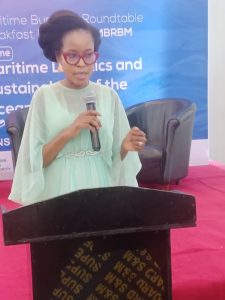
Engr Elsie Egwuatu, Head of Marine, NIWA, Lagos Office.
In a presentation, the National Inland Waterways Authority (NIWA), the statutory regulator of the inland waterways, outlined her critical role in promoting maritime logistics and the sustainability of the ocean economy by making operations on inland waterways safe and seamless. Represented by Engr Elsie Egwuatu, Head of Marine, NIWA, Lagos Office, the
agency dwelt on critical areas of concern currently including maritime accidents and safety, delays, disruptions and navigational challenges which are being tackled headlong with huge assistance from the Minister of Marine and Blue Economy, HE Adegboyega Oyetola.
NIWA, she stated, has also ensured the development of indigenous technical and managerial skills to meet the challenges of modern inland waterways transportation.
In her welcome address earlier, the Chair, Zoe Maritime Resources Ltd, Barr (Mrs) Oritsematosan Edodo-Emore said that as a coastal nation, it is important for Nigeria to harness ocean resources and develop her economy in a manner that sustains her teeming population while eradicating poverty in the land. Maritime logistics, she observed, is an acute driver of the ocean economy.
“In this digital age, it is important to evaluate how logistics is affecting the development of the ocean economy. What are our obligations in maritime logistics? What are the opportunities and how can these be harnessed to uplift the Nigerian populace and, by extension, develop the African continent?”
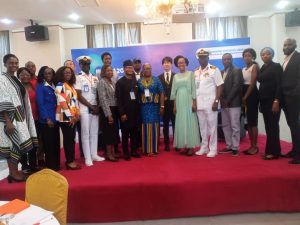
Other participants in the panel discussion included the representative of Oluwadamilola Emmanuel, General Manager, Lagos Waterways Authority (LASWA), the Nigerian Navy and Mrs Ruth Ikem Chukwukezirim, CEO, Global Energy and Logistics.
Maritime Agencies
‘OPERATION WHIRLWIND’: Customs Renews Commitment to Tackling Smuggling, Hauls Largest PMS Seizure in Kebbi.
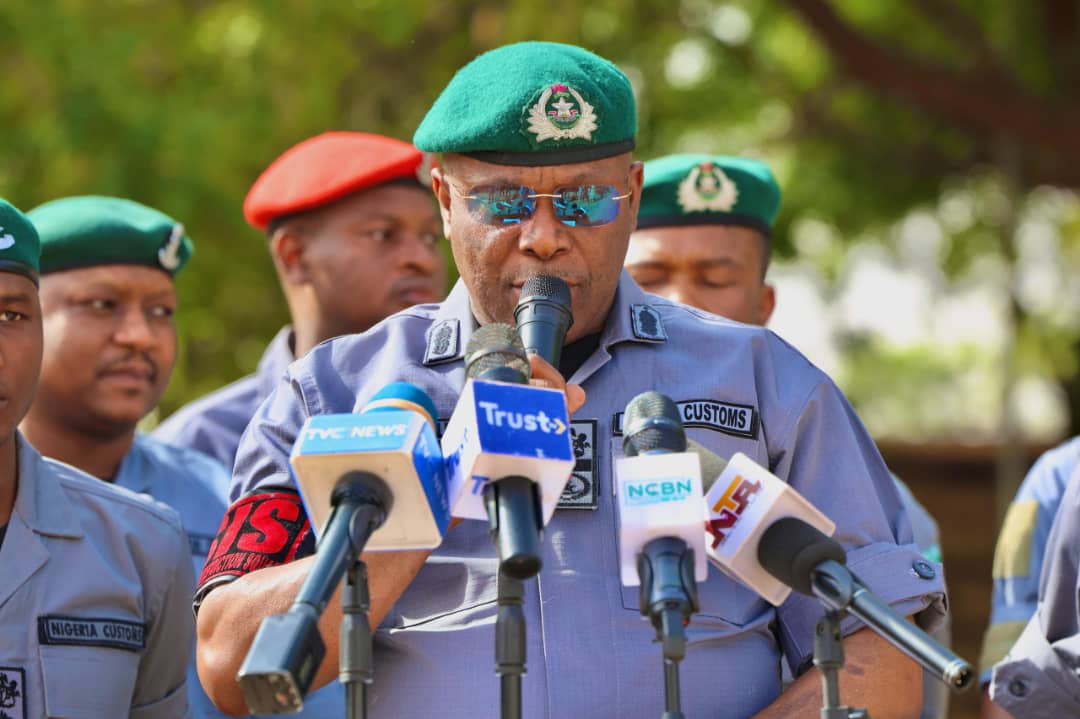
By Izuchukwu Ozoemena
Assistant Comptroller-General of Customs (ACG) Hussein Ejibunu, National Coordinator, ‘Operation Whirlwind’, a special task force of the Nigeria Customs Service on overcoming the menace of petroleum products smuggling, Tuesday, showcased what he described as the largest single seizure of smuggled Premium Motor Spirit (PMS) in Kebbi State since the operation was berthed.
Speaking at Birnin Kebbi, Kebbi State capital, Ejibunu who is also in charge of Financial Administration and Special Duties at the Customs Headquarters said the smuggling of PMS poses a serious threat to the Nigerian economy as it leads to revenue losses, distortion of trade statistics, artificial scarcity, and threats to national security.
The massive seizure, he announced, marks a significant milestone in the efforts of the Nigeria Customs Service (NCS) to protect Nigeria’s critical resources.
“The Nigeria Customs Service remains resolute in tackling smuggling activities that undermine government policies and economic stability,” ACG Ejibunu stated.
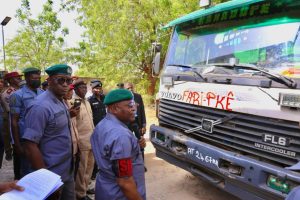
Items seized include 766 jerrycans of 25 litres each and 18 drums of 200 litres each of PMS conveyed in a Truck Plate number DC 7184 RB (Nigeria Plate Number) and 1,454 25-litre jerrycans and 18 200-litre drums of PMS loaded in a Truck number AT 2457 RUP (Republic of Benin plate.
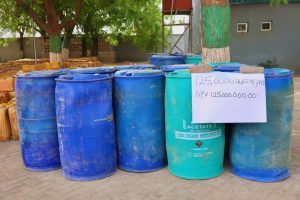
According to him, Truck number BV C240 Arubi—Republic of Benin plate number carrying 1,350 jerrycans, each 25 litres, and 18 drums, each 200 litres of PMS was also confiscated.
Additionally, 805 kegs of 25 litres of PMS seized at various flashpoints in the zone including Dole Kaina, Zaria Kalakala, Tunga Waterside, Lolo, and Tsamiya were also displayed.
The interception, which resulted from credible intelligence, occurred in the Tsamiya area of Kebbi State following days of painstaking surveillance.
Ejibunu who restated the determination of the NCS to sustain the fight against fuel smuggling said the Service is ever prepared to strengthen inter-agency collaboration so as to secure Nigeria’s borders.
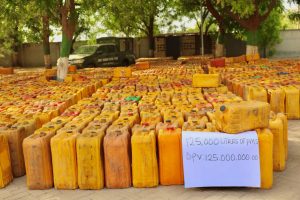
Kegs of confiscated PMS.
The seized PMS was sold at a controlled price of N10,000 per 25-litre jerrican to ensure that citizens rather than the smugglers themselves benefit.
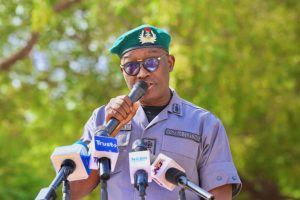
Chidi Nwokorie, CAC, Kebbi Command.
Addressing the press, Comptroller Chidi Nwokorie, the Customs Area Controller (CAC), Kebbi Command, reiterated his commitment to combat smuggling and other illicit trade activities in Kebbi State. He assured stakeholders of the Command’s determination to enforce trade regulations.
“We remain committed to facilitating trade and ensuring a seamless business environment for legitimate traders. For smugglers, our operations will only intensify to bring smuggling to its lowest possible level,” he pledged.
While recognizing how effective intelligence-driven operations can be, CAC Nwokorie commended the efforts of Customs officers in executing successful enforcement operations.
He also acknowledged the collaboration with sister agencies, highlighting their critical role in ongoing anti-smuggling initiatives.
“This success is a testament to the dedication and synergy between Customs and other security agencies. We will continue to work together to protect the nation’s economy,” Nwokorie added.
On his way back from Kebbi, ACG Ejibunu visited the Sokoto Customs Area Command, where he met with the Customs Area Controller, Sokoto-Zamfara Command, Comptroller Umar Abdulkadir and officers and men of the Service.
He used the opportunity to reaffirm the commitment of the Service to border security and the fight against smuggling.
-
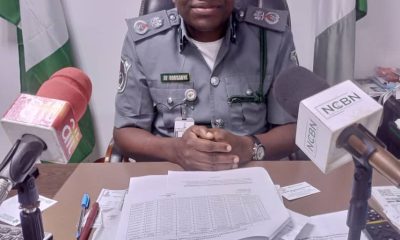
 Maritime Agencies2 weeks ago
Maritime Agencies2 weeks agoLilypond Export Command Is Meeting Expectations, Handles 70% of Nigeria’s Total Tonnage of Export Cargo, says CAC Odusanya.
-

 Personality Interviews3 weeks ago
Personality Interviews3 weeks agoTRADE FACILITATION: FULFIL CUSTOMS REQUIREMENTS, ENJOY AEO, B’ODOGWU, says Ayokunle.
-
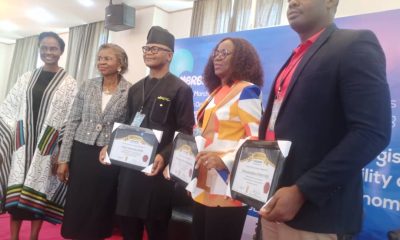
 Maritime Agencies4 days ago
Maritime Agencies4 days agoZoe Maritime Breakfast Meeting: NCDMB, NIWA, LASWA Discuss Maritime Logistics, Sustainability of Ocean Economy.
-
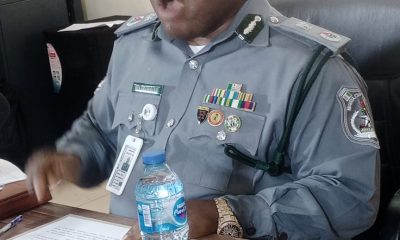
 Maritime Agencies3 weeks ago
Maritime Agencies3 weeks agoSEME CUSTOMS: Dr Oramalugo Dares Smugglers, Seizes N267m Illicit Drugs, PMS, Rice In A Month
-

 Maritime Agencies1 week ago
Maritime Agencies1 week agoANTI-SMUGGLING: Kebbi Customs Generates N13.3M In A Month, Confiscates Contrabands Worth N84.2 M.
-
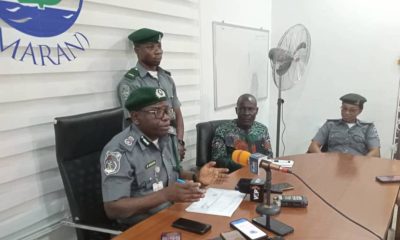
 Maritime Agencies3 weeks ago
Maritime Agencies3 weeks agoCustoms Export Command Seeks Seamless Movement To Ports To Evacuate Export Containers
-
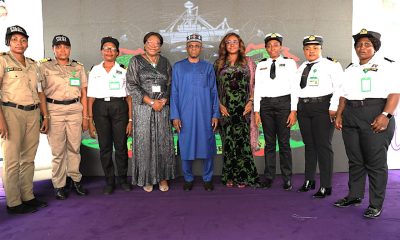
 Maritime Agencies3 weeks ago
Maritime Agencies3 weeks agoINTERNATIONAL WOMEN’S DAY, 2025: NPA Pledges Equal Rights For Women In the Workplace.
-

 Maritime Agencies1 week ago
Maritime Agencies1 week agoPorts Commissioner of Police Commends Bivbere-led MARAN for Responsible Reportage of Maritime Sector


























